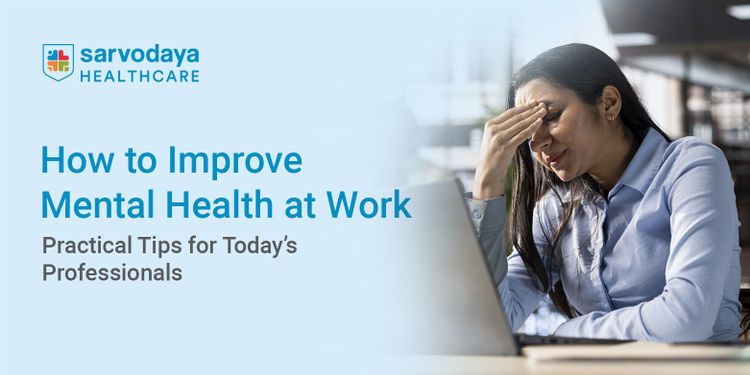In today’s fast-paced corporate world, mental well-being has become just as important as physical health. Tight deadlines, performance pressure, long working hours, and lack of personal time can all take a toll on emotional balance. Unfortunately, many working professionals overlook their mental wellness until it begins to affect productivity, relationships, and overall quality of life.
In this blog, we explore tips for mental health, practical ways to improve mental health, and discuss how to be mentally healthy even in demanding professional settings.
Understanding Mental Health in the Workplace
For working professionals, mental health is not simply the absence of illness but the ability to manage emotions, build resilience, and maintain clarity under pressure.
Below are some key reasons why maintaining good mental health is vital for working professionals:
- Enhanced Productivity: A clear and calm mind improves performance and decision-making.
- Improved Relationships: Emotional stability helps build better professional and personal connections.
- Resilience to Stress: Mentally healthy individuals can adapt to changes and manage pressure more effectively.
- Better Physical Health: Emotional wellness positively impacts sleep, immunity, and energy levels.
Signs Your Mental Health Might Need Attention
Many working professionals tend to dismiss emotional distress as fatigue or “just a rough day”. However, ignoring the signs can lead to burnout or deeper mental health issues.
Below are a few warning signs that your mind may need rest and care:
- Persistent Fatigue: Feeling tired even after adequate rest or sleep.
- Loss of Interest: A lack of motivation or enthusiasm for work or hobbies.
- Irritability or Mood Swings: Overreacting to small issues or feeling emotionally drained.
- Difficulty Concentrating: Struggling to focus on tasks or make decisions.
- Sleep Disturbances: Trouble falling asleep or waking up frequently during the night.
- Withdrawal from Others: Avoiding colleagues, friends, or family members.
Consulting the best psychiatrist in Delhi NCR can help identify underlying causes and provide the right mental health care to restore balance and clarity.
Practical Tips to Improve Mental Health at Work
Maintaining emotional well-being in a demanding job environment requires deliberate effort.
Below are some proven strategies on how to be mentally healthy and reduce workplace stress:
- Set Clear Work-Life Boundaries: Avoid checking work emails after hours or bringing office stress home. Dedicate time each day to relax, unwind, and focus on personal activities. This balance prevents burnout and promotes long-term stability.
- Prioritise Physical Activity and Sleep: A healthy body supports a healthy mind. Regular exercise releases endorphins that reduce stress and anxiety. Likewise, getting 7–8 hours of sleep each night rejuvenates the brain and enhances focus.
- Practise Mindfulness and Relaxation Techniques: Taking short breaks, meditating, or practising deep breathing can reduce tension and help you remain centred during hectic schedules. Even five minutes of mindful breathing can reset your mood and perspective.
- Stay Connected with People You Trust: Human connection is a cornerstone of mental health care. Talk to supportive friends, colleagues, or family members about your feelings. Sharing lightens emotional load and strengthens your support system.
- Manage Stress Proactively: Plan your day effectively, set achievable goals, and avoid multitasking. Recognising your limits and saying “no” when necessary can prevent emotional exhaustion.
- Seek Professional Help When Needed: Speaking with the best psychiatrist in Faridabad ensures that you receive personalised care, therapy, or counselling designed to help you regain control over your emotional well-being.
Role of Employers in Supporting Mental Health
While individuals play a major role in maintaining their own mental health, organisations also have a responsibility to foster supportive environments that prioritise employee well-being.
Employers can take several proactive measures to promote good mental illness treatment among their teams:
- Encourage Open Communication: Employees should feel safe discussing their struggles without fear of judgment or repercussions.
- Offer Mental Health Programmes: Regular workshops, awareness sessions, or employee assistance programmes help reduce stigma and promote access to care.
- Provide Flexible Work Arrangements: Hybrid schedules or flexible hours can significantly reduce stress and prevent burnout.
- Recognise and Reward Effort: Appreciation and recognition go a long way in improving morale and emotional wellness.
- Ensure Reasonable Workloads: Managers should balance task distribution and avoid unrealistic deadlines that may lead to chronic stress.
Lifestyle Changes to Support Mental Wellness
Small but consistent lifestyle changes can have a significant impact on your psychological well-being.
Here are some effective ways to improve mental health through daily habits:
- Maintain a Balanced Diet: Foods rich in omega-3 fatty acids, fruits, and whole grains can positively affect mood and cognitive function.
- Stay Physically Active: Regular movement, be it yoga, brisk walking, or gym workouts, helps release stress hormones and promotes better sleep. Physical health directly supports mental clarity and resilience.
- Take Regular Breaks from Screens: Digital overload can worsen fatigue and anxiety. Scheduling short breaks and practising digital detox on weekends helps refresh your mind and improve focus.
- Engage in Hobbies and Creative Activities: Pursue something you love outside of work, such as music, gardening, or painting. Creative expression enhances self-esteem and serves as an emotional outlet.
- Spend Time Outdoors: Exposure to sunlight and nature improves mood, lowers stress, and helps regulate sleep cycles. Even 20 minutes of outdoor time daily can enhance mental well-being.
- Build and Nurture a Support System: Maintain connections with family, friends, or peers who encourage positivity. Emotional support is an essential part of maintaining strong mental health.
Conclusion
Caring for your mental well-being is just as important as maintaining your physical health. In a world that demands constant productivity and performance, prioritising your mental health ensures you remain focused, balanced, and motivated.
At Sarvodaya Hospital, Faridabad, comprehensive mental health care is provided through expert consultation, counselling, and personalised treatment plans. The hospital’s experienced specialists, including some of the best psychiatrists in Delhi NCR, offer holistic care for emotional, behavioural, and psychological well-being. Whether you are dealing with chronic stress, anxiety, or want to take a preventive approach, a mental health consultation at Sarvodaya Hospital can help you identify underlying causes early and guide you toward lasting stability and inner peace.
If you or someone you know is struggling to manage stress or emotional distress, don’t wait until it becomes overwhelming. Book an appointment now at Sarvodaya Hospital, Faridabad, for expert guidance and comprehensive mental health support.





















